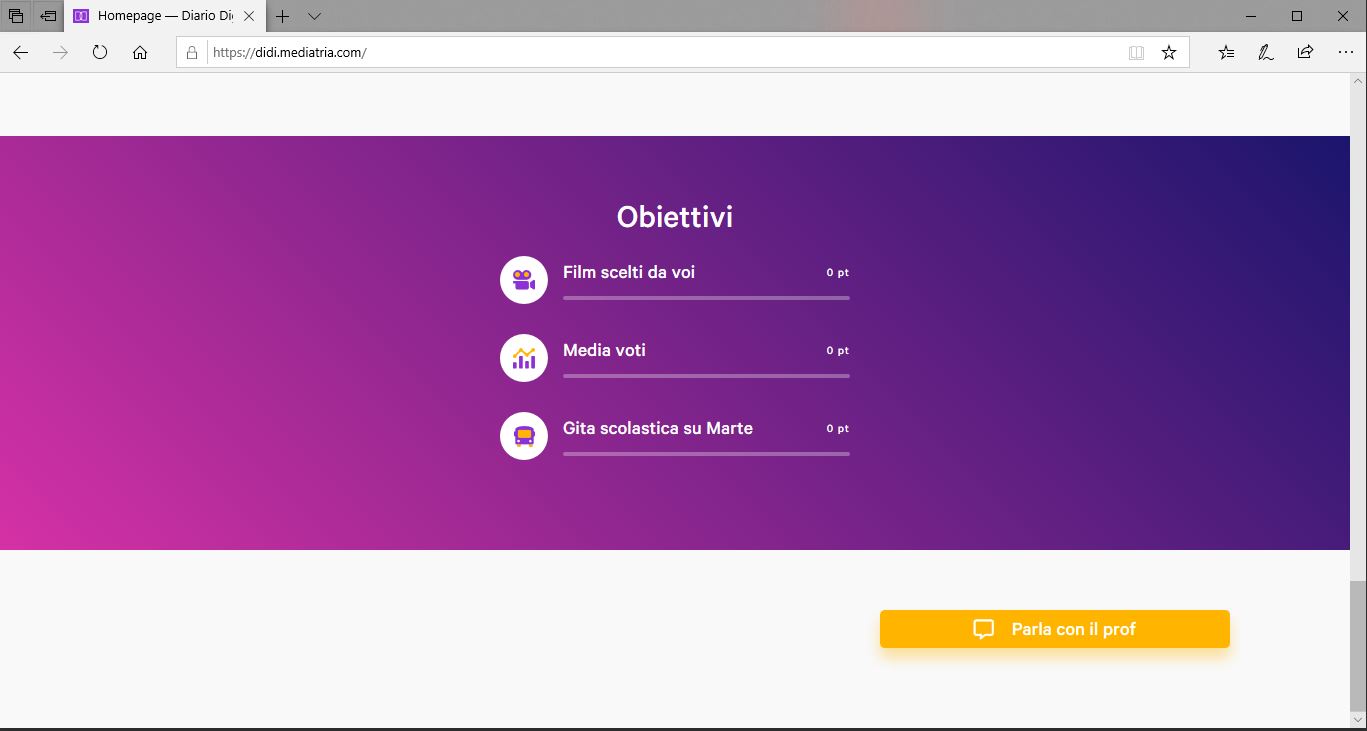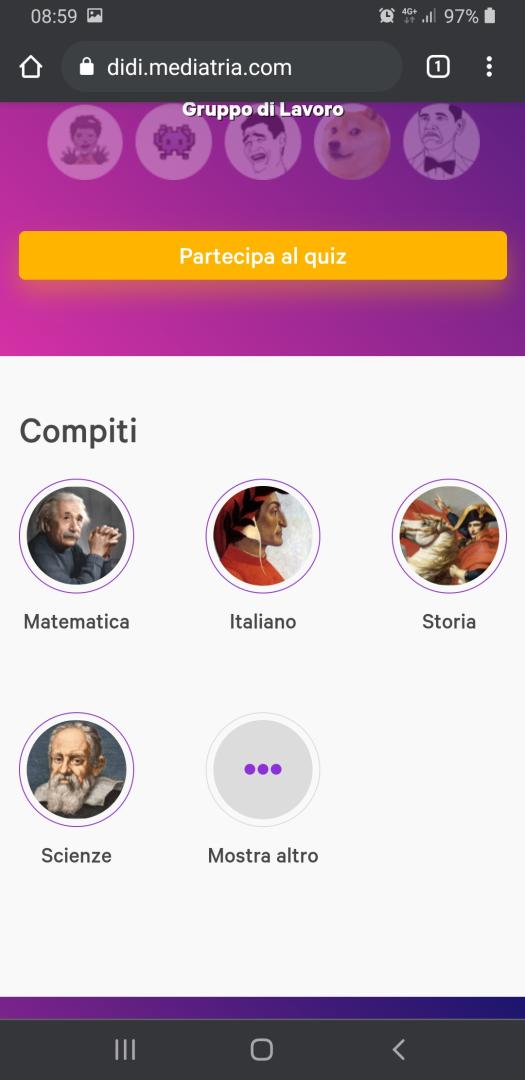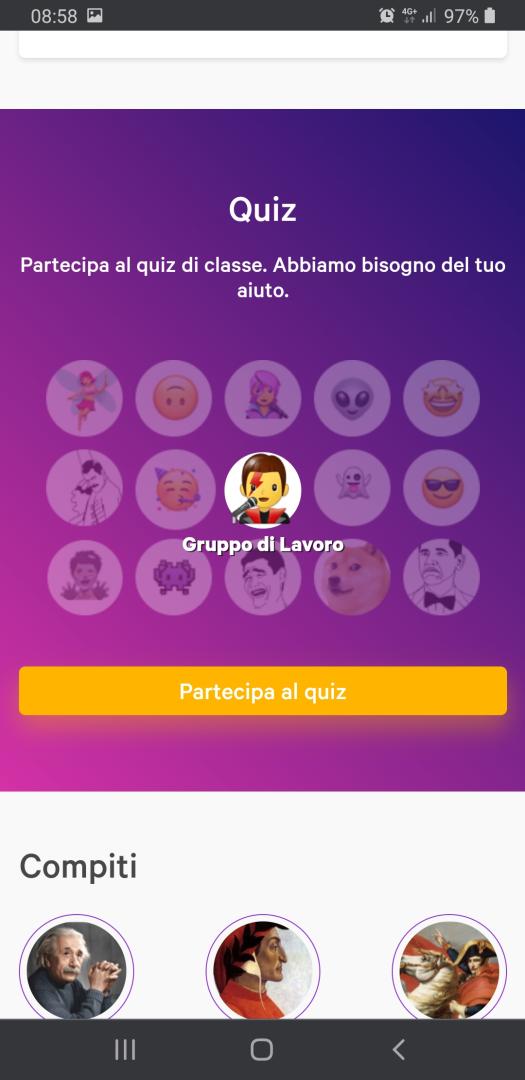DiDì
Basic information
Project Title
Full project title
Category
Project Description
The project was born with a view to digital innovation and the sensitivity of a new renaissance: the school diary will no longer be personal but become the diary of the team, the meeting place for the whole class, work and leisure, where children will share useful information for academic achievement, models to imitate, moments to remember for the benefit of all. The digital tool aims at creating complicity between children so that the excellence of each one acts as a driving force for all.
Project Region
EU Programme or fund
Description of the project
Summary
The project consists in the creation of a digital diary, through an IT platform, and has the aim of initiating children to use advanced digital technologies by exploiting their everyday school experience. DiDì project replaces the personal diary and represents the virtual meeting place for all children, accessible from any technological device. Each child provides useful information for the study and their skills, using the diary as a place for free exchange of ideas and solutions to any problems.
The project aims at promoting a technical-scientific culture marked by digitization, where digital does not mean only the use of an IT platform and the reproduction with a code of activities and processes otherwise realized, but it is above all a mental approach, a culture. Digitization has many great advantages that go beyond technology, it is immediacy, transparency, cooperation, flexibility. The transformation is transversal, it involves everyone, shortens distances and promotes everyone's skills.
The project was conceived, promoted and managed by the Italian Association of Women Engineers and Architects in Milan, carried out in collaboration with the students and teachers of the School, with a strong multi-ethnic character, the support of 2 psychologists and a web design expert. The digital diary is developed through InVision - a digital product design platform-, it is built as a scalable structure so can be replicated n times, the communication system was created via e-mail and the solution adopted is responsive, both for mobile and for PC.
The project involved the 3rd D class of the “Ermanno Olmi” Middle School in Milan and was launched in April 17th, 2019 with a Hackathon at school, where the students, divided into groups, competed to propose the desired diary model. At that time, digitization at school was almost non-existent: the PC was used only during computer hours and the use of cell phones was prohibited. The work ended on 16/06/2020, in full pandemic.
Key objectives for sustainability
DiDì is the virtual place where meet and share, used for positive exchange and community building strong social purpose. This goal cannot be achieved without the contribution of the technology, essential for the development. Digital technology represents the greatest ally of sustainability: combining technological innovation and social welfare will help to become protagonists of this change to create a real synergy for a better economy
The main objectives of the project are in the name of sustainability:
• Keep up with the times. Involving the new generations personally in the digitization process that is revolutionizing the way we operate and collaborate, preparing them to be protagonists of this transformation. To achieve this goal, computer labs were organized every week which gave the children not only the opportunity to learn but also to guide the construction of the platform by suggesting all the features.
• Highlight the various aspects of digitization: transparency, traceability, memory. To achieve this goal, the platform was structured so that everyone can see everything and that the tasks and all the loaded info remained in memory. The diary uses cloud technology
• Building a class complicity, create a digital meeting place to form a real cohesive group. Technology represents the tool to operate in a new way, but the real novelty consists of the opportunity to make everyone's role evolve, share skills by promoting everyone's contribution. To achieve this goal, the psychologists held several lessons in class on the importance of a conscious use of technology (Netiquette) and that connection is above all mutual support.
• Get the kids used to working in a team. To achieve this goal, the entire project was carried out with the students, from computer labs to Netiquette lessons, always leaving plenty of room for debate and dialogue. It was highlighted to the students that the coordination of the project also took place in a team.
Key objectives for aesthetics and quality
The project had to obey the canons of effective communication, one that immediately empathized with such young children and that was based on the criteria of innovation, sharing, involvement of people.
The digital platform also had to be structurally simple, intuitive in use and accessible from any computer medium. (PC, Tablet, Mobile ...).
The first goal was achieved by creating a mascot/logo, called DiDì, to symbolize the values of the project: a funny crossed-eyed doll with triangular head, index of diversity , who wears a light bulb hat, sign of brilliant ideas, with an open notebook like body that is so reminiscent of a female skirt. The language used and the examples described are simple and straightforward.
The choice of the splash page played an important role: it had to be very inviting as a color and remember a video game. The possibility of customization was also considered by choosing the image that represented the profile.
The second objective was achieved by building an essential platform both in the organization of the contents, as can be seen from the home page, and in the structure. A section dedicated to the game was also considered
The digital diary is accessible from any media at https://didi.mediatria.com, used with personal credentials.
The whole project was carried out in a friendly atmosphere and with the maximum participation of all the children. The project was selected for the “STEM in the city 2020” event organized by the Municipality of Milan.
Key objectives for inclusion
The concept of inclusion guides the project: the diary serves for mutual aid, so everyone can learn in an easier way .
A laboratory teaching method according to which children contribute to the construction of the digital platform, learn to use it and constantly compare themselves with each other and with the work team, applying the rules of real and digital coexistence.
The computer labs, consisting of a series of seminars-meetings, were distributed throughout the school year.
The meetings are organized giving priority to the debate between the students, the professors and the work team. Debate is considered the best methodology for acquiring transversal skills.
The work team is integrated: an eighth grade class, a tutor chosen among the professors, a project team made up of a group of engineers, a computer technology specialist, two psychologists, a web technology professional
The group is promoted, giving centrality to the "contribution" of the individual rather than to "who“ proposes it. Despite the common practice of social media where every contents has a specific author.
We made sure that all the students had an IT support (PC, Tablet, mobile) to be able to access the digital diary, we profiled all of them with an email address and credentials, monitoring the accesses. At the end of each lab, goals were assigned to be achieved within the following week. After having initiated the children to use the platform, we noticed that this has become a virtual meeting place.
The pandemic slowed down the implementation of the project but several aspects of inclusion are evident:
• The children appreciated having "built" something together with their classmates;
•The project was told by the students in a video and it is noted that the most important aspect they express is that with "DiDì" you are never alone”
• The diary traced a sort of memory of the class;
• The students asked for "extend" in high school
Results in relation to category
•DiDì had the great intuition to grasp the need for a shared platform in the school environment a year before the COVID 19 emergency, not a school register, not an application between teachers and pupils, but made by pupils and for pupils. DiDì was also a testing ground - pre-Covid - for sharing topics, comments, initiatives of various kinds, not only to acquire new digital skills but also to acquire a new mentality made up of sharing and mutual support.
•The exercise of this activity was strongly supported by socio-behavioral training on the use of shared technology and social media in general. The students confronted and tried their hand at Netiquette, today certainly a precious ally of distance learning and all their experiences on the web.
•From a practical point of view, DiDì allowed the 3rd D class "to never stop", even when the lockdown for the health emergency left everyone at home, the children remained connected to each other and to the school. The students were positively impressed by this circumstance. During the pandemic period there was a transition from a face-to-face training system to a remote training system and thanks to DiDì all the teachers were able to assigned homework to students and received feedback from them.
•The most important result is a new approach to study, debated at school and initially not shared by the teachers: each child gives his own contribution to the diary, also uploads the tasks performed and it does not matter that someone may initially copy but it is essential to trigger interest at the studio. A shared study method rather than a competitive one gives greater results in terms of common knowledge and social strength.
•An additional need was achieved: completing the annual education program to lead class to final exam. Someone has prepared the paper for the exams on the DiDì project.
How Citizens benefit
The project was carried out in a participatory manner by AIDIA_Association of Italian Women Engineers and Architects of Milan and the various subjects involved in the project, such as the students of the 3D class year 2019-2020 of the "Ermanno Olmi" school in via Maffucci in Milan and their parents, the teachers of the same class, the principal of the school, the psychologists of the Pollicino Association and the Parents Crisis Center of Milan, the Web specialist. Each subject has a specific role:
• AIDIA conceived and managed the project, as well as coordinating all the meetings with the children;
• The students were the protagonists of the Hackathon by proposing their idea of a digital diary
• The psychologists managed some meetings dedicated to the conscious use of digitization and coordinated the construction of the classroom Netiquette.
• The Web specialist held the computer labs
• The children participated in the workshops and at the same time guided the construction of the diary with their needs.
The active involvement of all stakeholders is the real success of the project.
Innovative character
The innovative aspect consists in having shown the children that digitalization represents the tool to operate in a new way and the real novelty consists of the opportunity to share skills digitally to form a real social group.
The young people involved were surprising, almost as if the transition from paper to digital opened new frontiers and new paths till now denied. The possibility of an environment where you can virtually meet not only to study, helping each other, but also for extracurricular activities and getting to know each other better in aspects of life that are not always evident and manifest in the classroom. DiDì is the place where even the shyest children have understood they can express themselves, go beyond individual difficulties, work as a team and overcome the multiculturalism that sometimes limits natural involvement.
The Digital Diary is a friend's house with doors always open to all comrades, which welcomes everyone and where everyone is at ease. The Diary is also a playground, where there is always someone to play with, where you are never alone, where you can find answers to the doubts of everyday life. The digital diary is also the place where you can play a melody with the orchestra distributed around the world.




